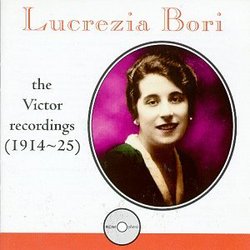The Best Available Of the Acoustic Bori Victor Recordings
Doug - Haydn Fan | California | 11/08/2007
(5 out of 5 stars)
"This is an exemplary issue, part one of the two part complete Victor recordings of Lucrezia Bori from Romophone. Sadly this issue is now out of print, but it's a standout, and anyone who likes Bori should find a way to acquire it through Amazon's used listings.
The set includes 46 chronological recordings spanning the years 1914 through 1925, the last four sport Victor's electric designation, and must be among the earliest electric recordings. There are eleven from 1914 and six more from 1915; following an extended hiatus while Bori recovered from a serious vocal condition the recordings begin again in 1921. In the following years Bori would return regularly to the studios, making on average half-a-dozen new recordings each year.
Bori was one of the finest lyric sopranos of her time, and excelled in the lighter soprano roles. Reading through the three volumes of Opera on Record (a must purchase for those of you interested in opera!) you can find a remarkable unanimity of high praise for Bori from a wide range of critics. Her musicality and intelligence, coupled with extraordinary dramatic gifts, make her one of the finest lyrics of the century. The only drawback was her voice simply didn't record well. Marston gives us as good a dubbing of her singing as we can hope to hear through CDs.
Bori's singing doesn't hit you over the head with a hammer; be prepared to relisten to her to fully gauge her gifts. Victor recorded her in many songs as well as opera arias, these generally are of a much higher standard than the norm. Although Bori is by no means a coloratura she essays a fair share of runs up the stave; I prefer her in roles where her acting, rather than any pyrotechnical gifts, plays the greater role in her singing. Of special note: Her Verismo singing does not receive the credit it deserves -although Bori, among the most patrician of singers, is not given to exaggeration or vulgar diplay, she seems right at home in the works of Mascagni. Indeed, her singing from L'Amico Fritz is wonderful, as is her brave go at the spine-curdling demands of Iris.
The adulatory notes, by William Ashbrook, convey the effect Bori had on her audiences, while helping the listener imagine through the recordings the distinctive achievment of Bori's art. Incidentally, there are surprisingly full notes for the second Romophone Bori set by John Steane.
"


 Track Listings (23) - Disc #1
Track Listings (23) - Disc #1